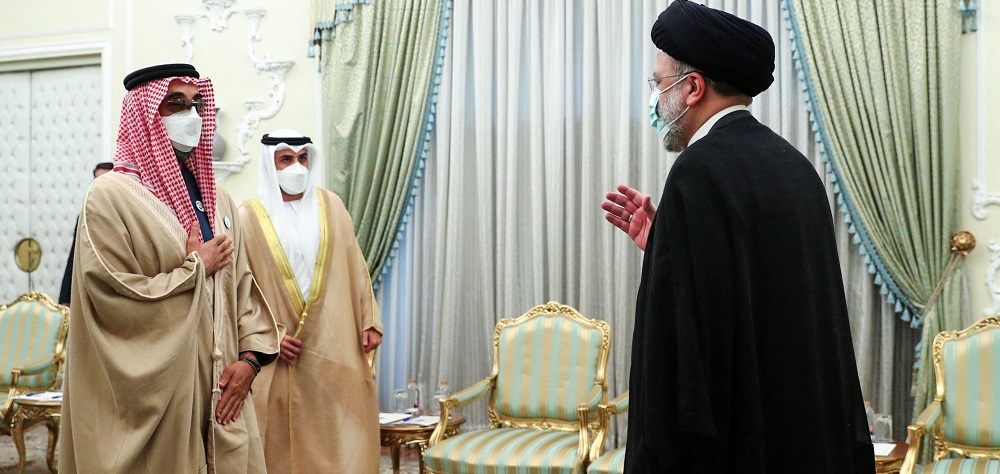Alwaght- The Monday visit to Iran of the UAE National Security Adviser Sheikh Tahnoun bin Zayed Al Nahyan that came a few weeks after Emirati FM's Syria visit triggered speculations about Abu Dhabi leaders' tendency to de-escalate with the Iran-led Axis of Resistance and create new relationship atmosphere with the Islamic Republic after years of ups and downs.
A set of reasons may have motivated the Emirates policy shift, including accepting the defeat in competition with the Resistance camp especially in Syria, involvement in regional cases outweighing its military and financial power, efforts to scale down geopolitical rivalry, seeking to alleviate Iranian concerns about normalization with Tel Aviv and Israeli presence in the Persian Gulf waters, and preparing for a post-American regional order. Each of these factors have been influential and explain part of the reality about the UAE view change.
Economic relations, which are pursued clandestinely, as well as and geopolitical concerns, are also giving reason to the Emirati leaders to seek to defuse tensions with Iran and Syria on the one hand and Turkey on the other hand as an escape route.
The UAE's worst fears since independence from the British colonialism began with the emergence of new Saudi ambitions to create economic transformation and move towards cutting dependence on oil revenues, accompanied by high-flying plans to build new industrial and free trade cities along shipping lines.
The UAE, which has built its economy on hosting an international financial center, an industrial free zone, and a global shipping line (DP World), sees Saudi Arabia's envisioned plans as an existential threat to its economic and geopolitical position.
Yemen is the main gateway to the Arabian Peninsula, but factors like weak government, historic conflicts between the north and south, and the inability of the weak Yemeni navy to secure shipping lines in its waters make it extremely hard to take economic advantage of this geographical features.
In such circumstances, the UAE assumed the role of being a trade gateway to the Arabian Peninsula. Huge oil trade in the Persian Gulf gives the Arab sheikhdom tremendous revenues. In fact, Abu Dhabi has always seen disruption of Yemeni ports and islands' performance enhancement as a basic necessity to maintain this lucrative position. This was the UAE's main goal to coalesce with Saudi Arabia in invasion of Yemen.
But now the cooperation between Saudi Arabia and the UAE in Yemen war has diminished and almost everything is close to a confrontation stage. Driven by its long Red Sea coastline and proximity to Bab-el-Mandeb Strait and Suez Canal of Egypt, Saudi Arabia dreams of causing UAE's commercial ports prosperity fall and becoming the largest regional trade hub by expanding its ports along the coast.
During Yemen war, Saudi Arabia has informed international companies and banks they should relocate their regional centers to Saudi Arabia from the UAE. A major part of the Emirati economy relies on being a transit route between the world and the Persian Gulf countries and any decision to disrupt this role and move it to Saudi Arabia would be a fatal blow, at least in the long run.
To advance his plans, the Saudi Crown Prince Mohammed ibn Salman is increasingly approaching Oman and offering Muscat the passage of oil pipelines from its territory to the Arabian Sea, in order for Riyadh to achieve its long-held dream to reduce dependence on the Strait of Hormuz. If realized, it would reduce the importance of the UAE ports in the Persian Gulf oil trade, combined with Saudi Arabia's attempt to strike the UAE's international shipping lines' leading role through Yemen war.
It is based on a mentality caused by these developments that the UAE all of a sudden chooses fast de-escalation with Turkey, Syria, and especially Iran and proposes to these countries tens of billions of dollars of investment to finance a new trade route.
The proposal eyes a sea corridor starting from Dubai and, crossing Iran and Turkey lands, at the end of the road reaching Syrian ports in the Mediterranean. The new route offers the UAE a safe, fast, and low-cost alternative to the historical sea trade through Gulf of Aden, Red Sea, and Suez Canal and saves the Emirati sea trade from a large-scale chaos caused by Saudi Arabia war in Yemen and incidents like six-day closure of Suez Canal by huge cargo ship in March.



























